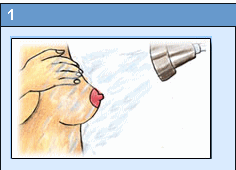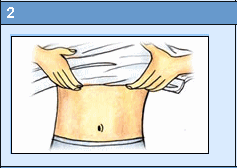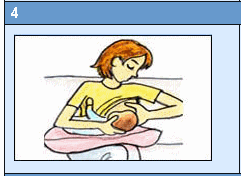My List of Goals for Breastfeeding
Here are some suggestions of goals for breastfeeding. Click on each goal you would like to add to your personal list. You can even print it to consult it.


Choosing to Breastfeed
During the first weeks you may have to express milk if:
This is how to express milk manually.
Most mothers do not need a breast pump. If you do need a breast pump, there are a variety of pumps available for rent or purchase from lactation consultants, hospitals, medical supply outlets, drug stores and some children's stores. Lactation consultants provide instructions and support for the pumps they supply. You can consult a public health nurse at 613-580-6744, a Lactation Consultant, La Leche League, a nurse or midwife about which pump is best for you. The type of pump you select depends on what you intend using it for.
 |
No matter which type of pump you select, you must always follow the instructions that come with the pump. |
Here are a few tips if you are planning on purchasing a breast pump.
Here are some suggestions of goals for breastfeeding. Click on each goal you would like to add to your personal list. You can even print it to consult it.
| HARD BREASTS | |
|---|---|
 |
Take a warm shower OR...
|
 |
Massage our breasts for 10 to 15 minutes using a damp towel. |
 |
Extract a little milk until the area surrounding the nipple softens. |
 |
The feed your baby. Breastfeed on demand and at least every three hours. |
 |
After feeding place a cold, damp towel on your breast for comfort and to reduce swelling. |
Deciding to breastfeed is the best choice because breast milk is the natural food for your baby. In this module you have learned how to prepare yourself well for a successful breastfeeding experience for you and your family.
The special bond between you and your baby will get stronger every day because of breastfeeding. The more experience you acquire the more comfortable you will become and the more breastfeeding will be enjoyable. Your baby will be grateful for life!

For more breastfeeding information and support visit Ottawa Public Health's website.
|
|
Congratulations! By completing this module, you have learned how to prepare to breastfeed your baby. The following exercise will allow you to verify if you are ready to begin the wonderful experience of breastfeeding.
Click on the button that corresponds to the correct answer and check your answer by clicking on the "Check" button.
|
1 |
The newborn should be placed to the breast |
|
2 |
Among the following people, who would be best suited to be part of your breastfeeding support group? |
|
3 |
How long is it recommended to breastfeed exclusively? |
|
4 |
What is the best thing your partner can do to help you breastfeed? |
|
5 |
While breastfeeding during the first days following birth it is better to |
|
6 |
While in the hospital, it is better to |
|
7 |
When is the best time to get ready for breastfeeding? |
|
8 |
Which among the following statements is not a good prenatal breastfeeding goal? |
Not all hospitals offer the same support to mothers who want to breastfeed. Find out if there is support for breastfeeding at the hospital where your baby will be born. Ask about this when you are pregnant so you will know what to expect. All New-Brunswick hospitals have lactation consultants that you can see during your hospital stay after the birth of your baby.

Now is time to create this support group so you will be ready when your baby is born. Here are a few suggestions.
It is good to plan your support network ahead of time. Think about friends, members of your family, professionals, and any other person who will be able to help. It is also a good idea to determine how these people can support you during breastfeeding.
With the help of a support group, you will have
Keep in mind that your family and friends will offer advice whether you have asked or not. Some advice will be helpful, some not. Don't be afraid to ignore the advice that is not good for you. Thank them and do what you think is best for you and your baby.